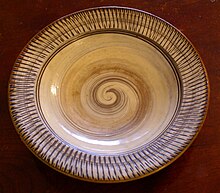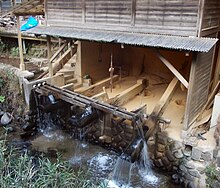Onta ware


Onta ware (小鹿田焼, Onta-yaki), also spelled Onda, is a type of Japanese pottery produced in and around the village of Onta in Ōita Prefecture, Japan.
History
[edit]The production dates back to the early 18th century CE. Onta ware is closely associated with Mingei folk art.[1]
Onta ware was inscribed by the national government in 1995 as an Intangible Cultural Property.[2][3] The area has also been inscribed as one of the protected 100 Soundscapes of Japan.
Production
[edit]
The earth for the pottery is found in the mountains around Onta. It normally comes in the form of rocks and needs to be ground to a powder. This is done by the usage of traditional water scoops or mills called kara-usu, which rely purely on the flow of the river. The wooden mills grind the earth into a powder, which is then washed and filtered multiple times to purify the material. It is then dried, sometimes over a large oven. The village has a self-imposed limit on how much earth can be taken from the mountains each year to ensure that there is enough material for future generations to continue production.[4]
The village is a tightly-knit community composed of, as of 2024, ten families of potters going back generations.[5] The work such as the purification of the earth is done by women, while men are responsible for actually creating the wares. Pieces are never signed by an individual but only with the sign of the Onta village. This is to signify that the production of a single vessel was the combined work of the community, not just one person.
Onta ware traditionally consists of utility vessels such as bowls, plates, and tea cups. The style is most often slipware.
See also
[edit]- Mishima ware, which also uses the slip technique
- Koishiwara ware
References
[edit]- ^ "Onda, Japan". Palmer Museum of Art. Archived from the original on 8 December 2021. Retrieved 2 October 2023.
- ^ "Database of Registered National Cultural Properties". Agency for Cultural Affairs. Archived from the original on 23 December 2019. Retrieved 15 March 2011.
- ^ "Ceramic Art and Crafts - 20.Onta-yaki" (PDF). Japan National Tourism Organization. Retrieved 2 May 2011.
- ^ "Journey to Onta – the ancient Japanese pottery village". Winterwares. 2020-06-16. Retrieved 2024-10-31.
- ^ "小鹿田焼の里 | 水が磨く郷 - 日田市観光協会ホームページ" (in Japanese). Retrieved 2024-10-31.
Further reading
[edit]- Wilson, Richard L. (1995). Inside Japanese Ceramics: A Primer of Materials, Techniques, and Traditions. Weatherhill. p. 108. ISBN 978-0-8348-0442-5.
External links
[edit]![]() Media related to Onta ware at Wikimedia Commons
Media related to Onta ware at Wikimedia Commons


